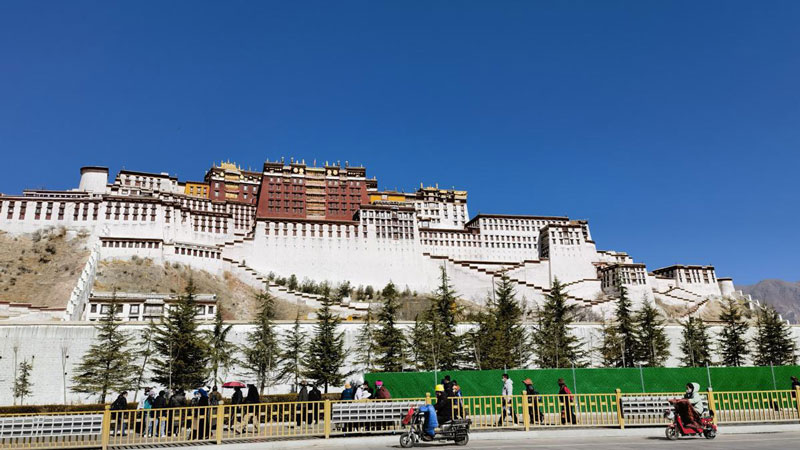Tyre Nichols' death once again exposes U.S. scars of police brutality, racial prejudice
NEW YORK, Feb. 3 (Xinhua) -- The past week has witnessed the nightly tides of street protests across the United States in the aftermath of the death of Tyre Nichols, which once again exposed the country's long-standing scars of police brutality and racial prejudice.
In a statement issued on Jan. 27. U.S. President Joe Biden said he "was outraged and deeply pained" by the incident, calling it "yet another painful reminder of the profound fear and trauma, the pain, and the exhaustion that Black and Brown Americans experience every single day."
Over again, federal officials and politicians vowed to "do everything in our power" to end such tragedy. However, similar incidents always take place from time to time in the country that is self-claimed as the "beacon of democracy."
APPALLING VIOLENCE
Mostly peaceful protests over police brutality were carried out around the country after the public release of body camera footage brought the police killing of Tyre Nichols in Memphis, Tennessee, into clearer picture.
Nichols, a 29-year-old Black motorist, was pulled over on Jan. 7 for what police said was reckless driving. After attempting to flee on foot, Nichols was aggressively beaten by police, newly released police video showed. Three days later, he died in the hospital.
Attorneys representing the family of Nichols have said that an independent autopsy they commissioned found Nichols suffering "extensive bleeding caused by a severe beating." The full findings of the report were not made public.
Four of the five former Memphis Police officers indicted for their role in the death of Nichols were suspended or received a written reprimand during their tenure, with only one charged officer avoiding internal disciplining during his tenure.
Nichols, the father of a four-year-old son, was known to his family as an avid skateboarder and nature photographer from Sacramento, California, according to The Associated Press.
He arrived in Memphis just before the pandemic and later started a job with FedEx, a major employer there. The New York Times reported that Nichols had been with the company for about nine months before his death.
WINDOWS BROKEN
"Tyre Nichols: U.S. police violence stems from a long history of fighting 'internal enemies,'" read a headline from U.S. news portal The Conversation.
"Next to other western democracies, America has historically had a far bigger proportion of racial and ethnic minorities," and few of those minorities have fit easily within the constitutionally recognized community of "the people," said the report.
"White authorities were very clear as to the rationale" that "Black people were neither citizens (like white men) nor members of households (like white women and children)," said the report. "Rather, they were an 'internal enemy,' a hostile and alien element within the lawful community."
Blacks were regarded as existential threats to the lawful population. These sentiments fuelled violence by the U.S. National Guard, by hired thugs known as Pinkertons and by lynch mobs, noted the news portal.
The most recent echo of the pattern is the so-called "broken windows" philosophy of policing that emerged in the 1980s and 1990s. The basic idea here is that fear of violent crime is itself cause for police intervention, it added.
LEGISLATURE FAILURES
Mourning the death of Nichols, U.S. Vice President Kamala Harris on Wednesday expressed hope that Nichols' death might "shine a light on the path toward peace and justice" as she called on Congress to pass police reform legislation.
Initially introduced in 2020 and again in 2021, the legislation is aimed at setting up a national registry of police misconduct to stop officers from evading consequences for their actions by moving to another jurisdiction.
The bill twice cleared the House of Representatives under Democratic control, in 2020 and 2021, mainly along party lines. But it never went anywhere in the Senate, even after Democrats won control in 2021, "in part, because of disagreements about qualified immunity, which protects police officers from being sued in civil court," CNN once reported.
"And the road for police reform has only become more challenging in the new Congress now that House Republicans, who have placed their priorities elsewhere, are in the majority," it added.
Photos
Related Stories
- U.S. politicians harm citizens more than guns
- Funeral service held for Tyre Nichols amid outcry over police brutality in U.S.
- Police violence shows racism only getting worse
- Deadly beating of Tyre Nichols yet another grave testament to entrenched racial discrimination in U.S.
- Protesters hit streets in U.S. after deadly police beating of Tyre Nichols
Copyright © 2023 People's Daily Online. All Rights Reserved.









